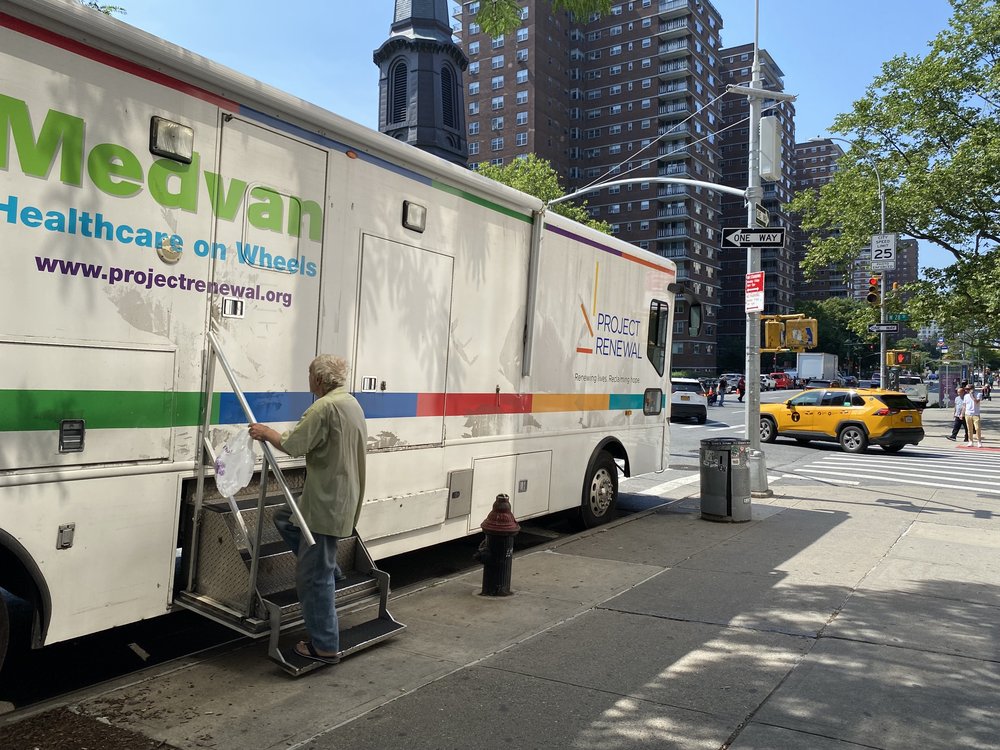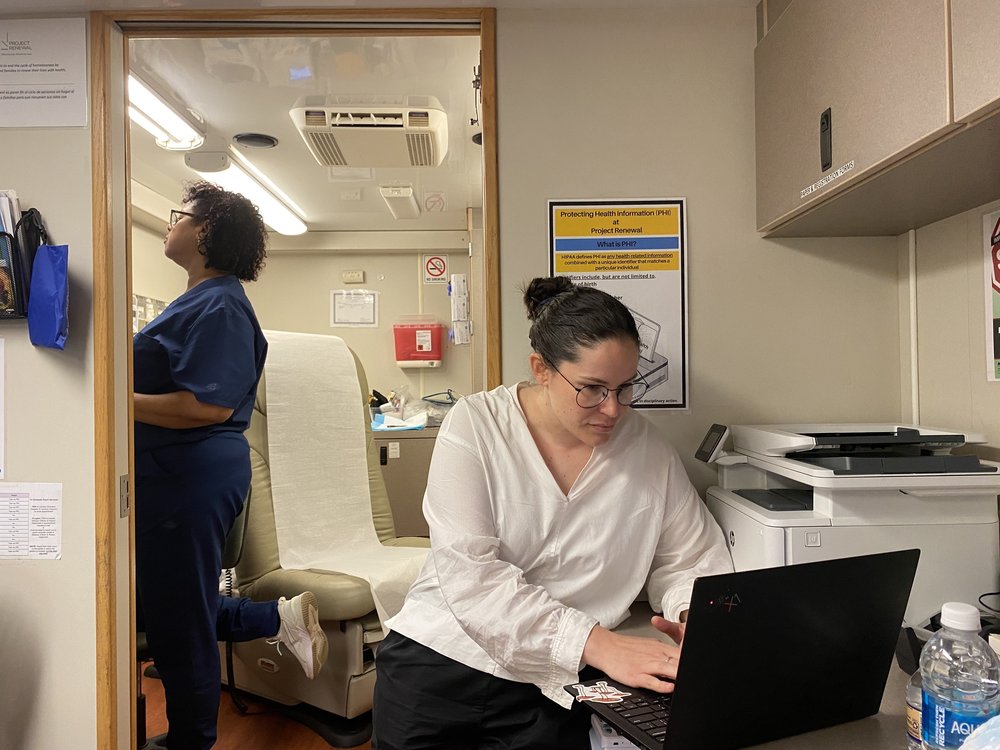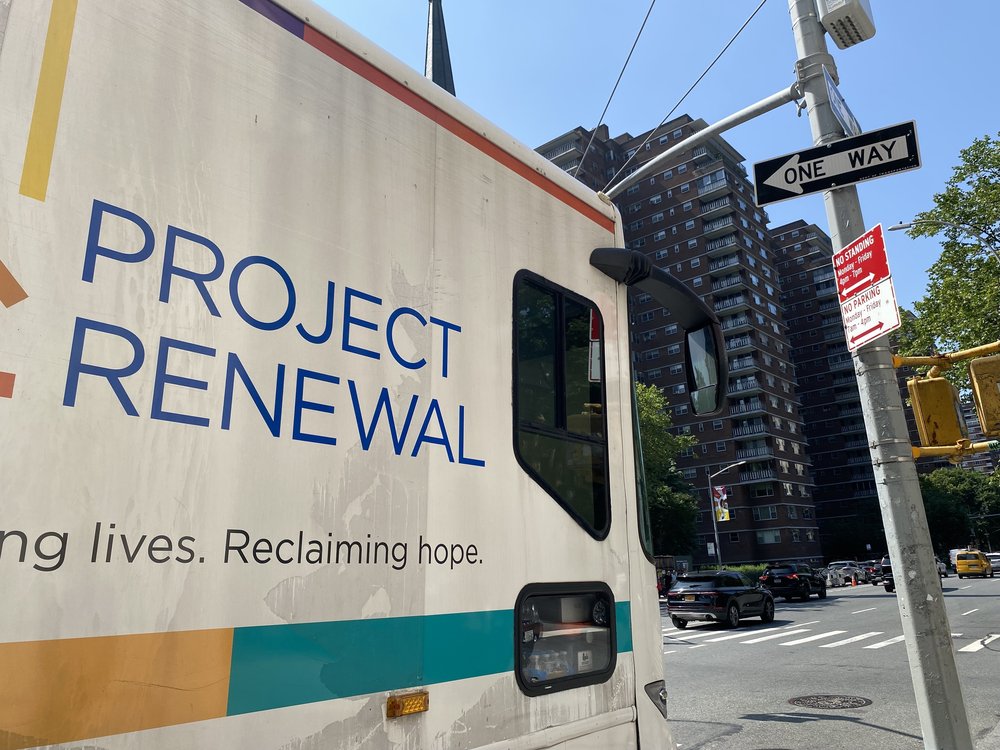This mobile clinic rolls up to homeless New Yorkers who need mental health services
July 7, 2025, 6:31 a.m.
Project Renewal’s mobile clinics help vulnerable New Yorkers get the medication they need.

Two days a week, an RV-like van parks outside a Chelsea soup kitchen with a licensed psychiatrist on board offering care to anyone who wants it.
There’s no need for a referral, insurance or a prior diagnosis. The clinic’s on-board psychiatrist helps people who are living on the street or in a shelter by prescribing medication, helping them manage their prescriptions or sometimes just listening.
The mobile initiative, run by a nonprofit organization called Project Renewal, is part of a citywide ecosystem that aims to treat people who are living on the streets and subways with serious mental illness. Now they are hoping to expand. While other service providers focus on street outreach or brick-and-mortar clinics, this mobile program sets up outside soup kitchens or shelters — places where people in need may gather — offering medical care coupled with mental health.

A record number of New Yorkers are living on the street though they still make up just 3% of the homeless population, who are largely residing in shelters. The city comptroller’s office estimates there are about 2,000 people living with serious mental illness who are cycling through the streets, subways, jails and hospitals.
The goal of the mobile clinic is to help individuals struggling with mental health issues before they experience a crisis or potentially get taken to the hospital by police against their will. Mayor Eric Adams made involuntary commitments a key part of his strategy to address street homelessness and mental health. In 2022, he expanded the rules for when someone can be involuntarily taken to the hospital and said it was a necessary step to improve public safety and make New Yorkers feel safer riding the trains. Those measures were codified into state law this year.
“ We connect with a lot of people who maybe haven't had the opportunity to have regular medical care, regular psychiatric care, and this is a low barrier way for them to come into treatment and then hopefully be able to follow up with us,” said Dr. Miranda von Dornum, who oversees healthcare for Project Renewal.
Vanda Sutton, 66, who sees her psychiatrist at the mobile clinic every month, said the van can be a lifesaver.

“ There’s a lot of people out there that need help,” she said. “You need somebody to actually talk to you. They listen to you and they advise you. And that is very helpful.
Sutton was living on the street when she first started coming to the clinic, she eventually moved to a hotel shelter and now lives in an apartment using a municipal housing voucher. But she says that wouldn’t be possible if she didn’t get the medication she needed and dealt with her trauma through therapy.
Dr. Rachael Holbreich, the psychiatrist in the clinic, said she often works with people who have experienced trauma through the health care system, either because they’ve been taken to the emergency room against their will or been bounced between the system without getting the treatment they need. She said a big part of her job is building trust so people will come back again.
“How do we actually help them long-term instead of just like a tune-up and sending them out?” Holbreich said. “That's a big part of why people like to come to the van too, because it doesn't just feel sterile or like a doctor's office.”
The mobile clinic model is one that Project Renewal wants to grow this year to include an additional van just focused on psychiatric services. The nonprofit operates three medical vans, and in 2023 began offering psychiatric services two days a week on one of them, in addition to primary care.
They’ve helped 2,400 patients in the last two years. The city’s health department also runs mobile treatment teams that provide mental health and substance abuse treatment.
“We know that it will take all of us — government, organizations on the ground, and individual commitment — working together to address the significant mental health needs of our city, and are grateful for the continued partnership of providers with deep community roots,” said Rachel Vick, a spokesperson for the Department of Health and Mental Hygiene.
NYC Health and Hospitals also operates a five-van fleet called Street Health Outreach and Wellness that provides basic medical care, substance abuse treatment, medication and referrals.
“Our teams on the ground quite often forge collaborative relationships with other organizations, we may refer people back and forth or share information, like, ‘hey, we saw people at this location,’" said Andy Cook, administrative director of NYC Health and Hospital’s program. Cook said they’ve treated nearly 3,000 patients.
Dr. Holbreich said much of her work is managing people’s medications, making sure it’s working for them or that they get their refills, and helping them build coping skills.
The program challenges how traditional clinics operate and don’t require patients to overcome all the hurdles usually needed to get a prescription, such as making additional appointments, doing bloodwork or requiring someone’s full medical history.
“ They might not wanna share it, they don't trust you. So we do our best to go off as little information we can to safely prescribe,” she said. ”Typical clinics don't work for everyone, especially a population with lots of stuff going on in their lives and unstable housing and who don't have charged phones.”
On a recent Monday inside the mobile clinic parked across the street from the Church of the Holy Apostles, two medical staffers and Holbreich inched their way around the two-room van. A patient coordinator helped people check in and took down their information. One man waited his turn as another older woman got her vitals checked. Another woman walked in but didn’t want to talk to the psychiatrist and left. A couple of people missed their appointments but periodically, someone would knock on the door and ask for services.
“ I can't really think of that many situations where you can just like walk by and say hi, and like say hi to your doctor,” Dr. Holbreich said.